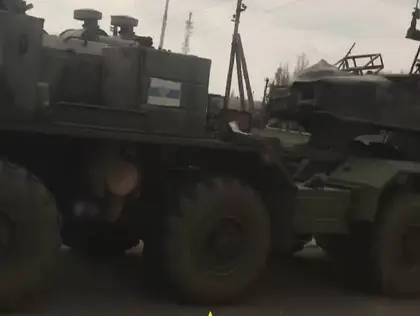Guerrillas from the ATESH movement uncovered the presence of a unique 9C19 Ginger radar system used for detecting ballistic missiles, spotted in Dzhankoy, occupied Crimea, as per their report shared via Telegram.
In a released video, the partisans disclosed, "An agent of our movement discovered the 9C19 Ginger radar system, which is being towed on tractors towards the military airfield."
JOIN US ON TELEGRAM
Follow our coverage of the war on the @Kyivpost_official.
The video footage showed the vehicle involved in a traffic incident, leading to its temporary halt.
"We tracked the movement of this radar station and indicated the exact coordinates of this equipment at the military airfield," the partisans stated.
Designated as the 9C19 Ginger, this Soviet-era self-propelled sector survey radar station is an integral component of the S-300V anti-aircraft missile complex in the Russian army. Its primary function is to collect data on air targets and transmit them to the command posts of the air defense forces.
"This radar station plays a crucial role in the enemy's anti-aircraft defense system," the message read.
Reports from Defense Express revealed that the S-300V complex, designed primarily for defense against Pershing-type ballistic missiles, is notably rare, even within Russia's military inventory.
Open-source data indicates that the Russian army possesses approximately twenty S-300V anti-aircraft missile systems, each incorporating a single 9C19 Ginger radar.

1,100 North Korean Casualties in Russia-Ukraine War: Seoul
Capable of detecting ballistic targets like Pershing missiles within a range of 75 to 175 kilometers, the 9C19 Ginger radar serves as the primary component ensuring the anti-missile capabilities of the entire S-300V complex.
In recent times, the ATESH partisans have frequently observed the presence of Russian military equipment in Crimea. Earlier instances include their tampering with Russian tanks stationed at the Yevpatoria railway station.
On February 23, the partisans documented the arrival of a significant fleet of Russian tanks at the Yevpatoria railway station.
ATESH closely monitored the unloading process of the tanks at Yevpatoria's Tovarna station, with their agents identifying more than 30 T-62 tanks. These tanks, Soviet-era models produced before 1975, are now considered decommissioned in Russia.
Previously, members of the ATESH partisan movement shared reports detailing their surveillance of Russian troop fortifications and military units within occupied Crimea.
Their observations highlighted ongoing efforts by Russian forces to fortify positions in the occupied territories, revealing strategic defense plans and construction activities in the region.
You can also highlight the text and press Ctrl + Enter






